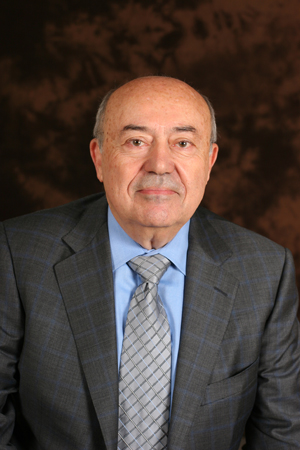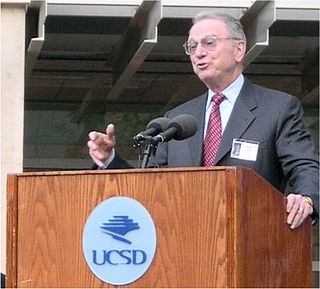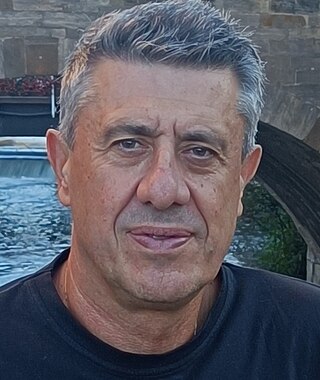Related Research Articles

Andrew James Viterbi is an Italian Jewish–American electrical engineer and businessman who co-founded Qualcomm Inc. and invented the Viterbi algorithm. He is the Presidential Chair Professor of Electrical Engineering at the University of Southern California's Viterbi School of Engineering, which was named in his honor in 2004 in recognition of his $52 million gift.

Irwin Mark Jacobs is an American electrical engineer and businessman. He is a co-founder and former chairman of Qualcomm, and chair of the board of trustees of the Salk Institute. As of 2019, Jacobs has an estimated net worth of $1.2 billion.
Ramesh Chandra Jain is a scientist and entrepreneur in the field of information and computer science. He is a Bren Professor in Information & Computer Sciences, Donald Bren School of Information and Computer Sciences, University of California, Irvine.

Vijay K. Bhargava is a researcher and Professor in the Department of Electrical and Computer Engineering at the University of British Columbia (UBC). He served the department as its Head for 5 years. Before moving to UBC, Bhargava was a Professor in the Department of Electrical and Computer Engineering at University of Victoria.
Yang Xiao is a professor of computer science at the University of Alabama.
Lee Swindlehurst is an electrical engineer who has made contributions in sensor array signal processing for radar and wireless communications, detection and estimation theory, and system identification, and has received many awards in these areas. He is currently a Professor of Electrical Engineering and Computer Science at the University of California at Irvine.
Chen Wen-tsuen is an ethnic Taiwanese computer scientist, a distinguished research fellow at the Academia Sinica and a lifelong national chair of the Ministry of Education, Taiwan. From 2006 to 2010, he was the president of the National Tsing Hua University, a premier research university in Taiwan.

Chai Keong Toh is a Singaporean computer scientist, engineer, industry director, former VP/CTO and university professor. He is currently a Senior Fellow at the University of California Berkeley, USA. He was formerly Assistant Chief Executive of Infocomm Development Authority (IDA) Singapore. He has performed research on wireless ad hoc networks, mobile computing, Internet Protocols, and multimedia for over two decades. Toh's current research is focused on Internet-of-Things (IoT), architectures, platforms, and applications behind the development of smart cities.

Robert W. Heath Jr. is an American electrical engineer, researcher, educator, wireless technology expert, and a Professor in the Department of Electrical and Computer Engineering at the University of California, San Diego. He is also the president and CEO of MIMO Wireless Inc. He was the founding director of the Situation Aware Vehicular Engineering Systems initiative.
Ranjan Kumar Mallik is an Indian electrical and communications engineer and a professor at the Department of Electrical Engineering of the Indian Institute of Technology, Delhi. He held the Jai Gupta Chair at IIT Delhi from 2007 to 2012 and the Brigadier Bhopinder Singh Chair from 2012 to 2017. He is known for his researches on multiple-input multi-output systems and is an elected fellow of all the three major Indian science academies viz. Indian Academy of Sciences, Indian National Science Academy, and The National Academy of Sciences, India. He is also an elected fellow of The World Academy of Sciences, Indian National Academy of Engineering, and The Institute of Electrical and Electronics Engineers, Inc.

George K. Karagiannidis is a professor of electrical and computer engineering at the Department of Electrical and Computer Engineering of Aristotle University of Thessaloniki and a director of Digital Telecommunications Systems and Networks Laboratory. He was named Fellow of the Institute of Electrical and Electronics Engineers (IEEE) in 2014 "for contributions to the performance analysis of wireless communication systems".
Eytan H. Modiano is a professor and associate head of the Department of Aeronautics and Astronautics and associate director of the Laboratory for Information and Decision Systems at Massachusetts Institute of Technology, Cambridge, Massachusetts.

Andrea Goldsmith is an American electrical engineer and the Dean of Engineering and Applied Science at Princeton University. She is also the Arthur LeGrand Doty Professor of Electrical Engineering at Princeton. She was previously the Stephen Harris Professor in the School of Engineering at Stanford University, as well as a faculty affiliate at the Stanford Neurosciences Institute. Her interests are in the design, analysis and fundamental performance limits of wireless systems and networks, and in the application of communication theory and signal processing to neuroscience. She also co-founded and served as chief technology officer of Plume WiFi and Quantenna Communications. Since 2021, she has been a member of the President’s Council of Advisors on Science and Technology (PCAST).

Franklin F. Kuo was a professor in many universities — Polytechnic Institute of Brooklyn, University of Hawaii, Stanford University, Jiao Tong University and University of Mannheim. He is the author of 8 books in network theory and on computer network communications. For over 40 years, he was a university professor, a research engineer, a US Defense Department manager, an Internet advisor in China, and an entrepreneur in Silicon Valley and China. He was best known as the co-developer to ALOHANET, along with Norman Abramson, at the University of Hawaii, 1969–1972.

Salman A. Avestimehr is a Dean's professor at the Electrical & Computer Engineering and Computer Science Departments of University of Southern California, where he is the inaugural director of the USC-Amazon Center for Secure and Trusted Machine Learning and the director of the Information Theory and Machine Learning (vITAL) research lab. He is also the CEO and Co-Founder of FedML. Avestimehr's contributions in research and publications are in the areas of information theory, machine learning, large-scale distributed computing, and secure/private computing and learning. In particular, he is best known for deterministic approximation approaches to network information theory and coded computing. He was a general co-chair of the 2020 International Symposium on Information Theory (ISIT), and is a Fellow of IEEE. He is also co-authors of four books titled “An Approximation Approach to Network Information Theory”, “Multihop Wireless Networks: A Unified Approach to Relaying and Interference Management”, “Coded Computing”, and “Problem Solving Strategies for Elementary-School Math.”
Fouad Tobagi is a professor in the Stanford Department of Electrical Engineering.
Nambirajan Seshadri is a professor of practice at the Department of Electrical and Computer Engineering, Jacobs School of Engineering, University of California, San Diego.

Zygmunt J. Haas is a professor and distinguished chair in computer science, University of Texas at Dallas (UTD) also the professor emeritus in electrical and computer engineering, Cornell University. His research interests include ad hoc networks, wireless networks, sensor networks, and zone routing protocols.
J. J. Garcia-Luna-Aceves is a Mexican-American computer engineer, currently professor at the University of Toronto's Department of Electrical and Computer Engineering. Until 2023, he was the Distinguished Professor of Computer Science and Engineering at University of California at Santa Cruz UCSC, holding the Jack Baskin Endowed Chair of Computer Engineering, is CITRIS Campus Director for UCSC, and was a Principal Scientist at the Xerox Palo Alto Research Center. He is a Fellow of the IEEE for contributions to theory and design of communication protocols for network routing and channel access and a fellow to AAAS.
Anthony Acampora is a professor emeritus of Electrical and Computer Engineering as well as the founder of the Center for Wireless Communications at the University of California, San Diego.
References
- ↑ "IEEE Fellows 2014". IEEE Fellows Directory. Retrieved 2 December 2019.
- ↑ "Sujit Dey". University of California, San Diego. Retrieved 2 December 2019.